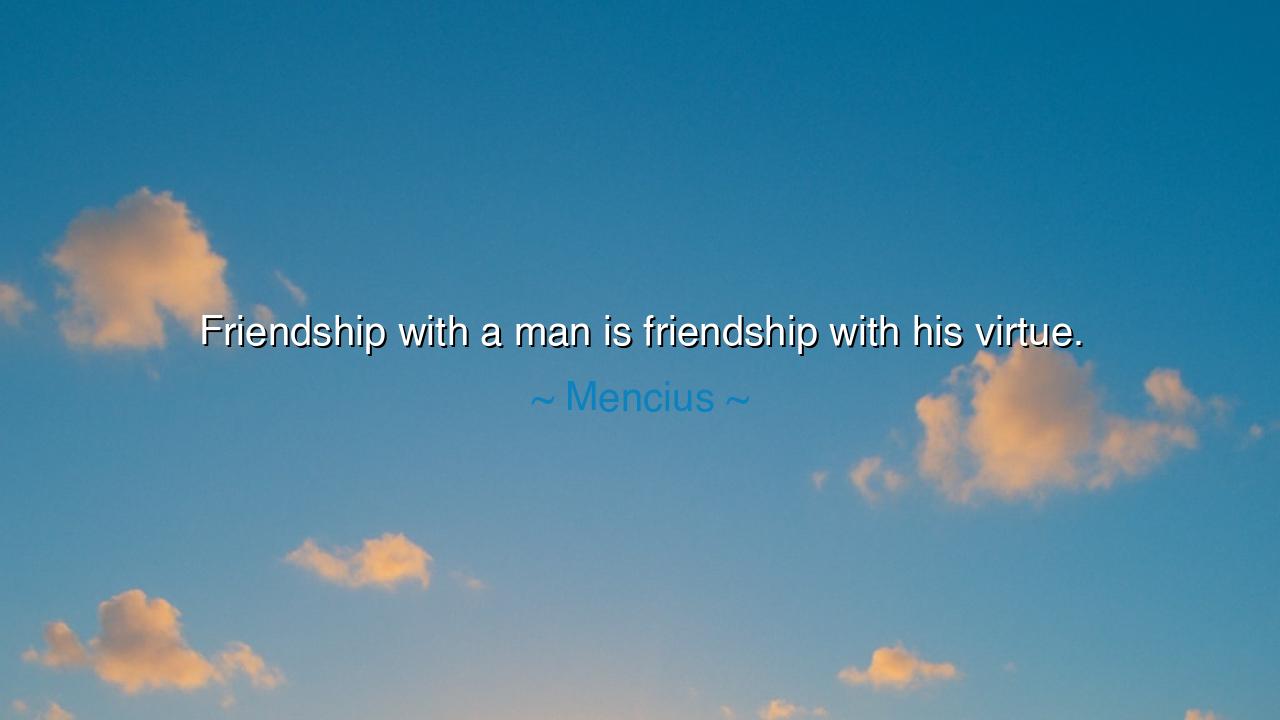
Friendship with a man is friendship with his virtue.






"Friendship with a man is friendship with his virtue." These words, spoken by the great Mencius, carry a profound truth that transcends time and culture. What he teaches us is that to truly know a person, to truly call them a friend, one must not only understand their words and actions, but also their virtue—that core of goodness, honesty, and honor that shapes their character. A man’s virtue is not merely a part of him; it is the very essence of his being, and it is through his virtue that friendship is truly formed. Thus, to form a genuine friendship with someone is to bond with the very heart of who they are, not just their outward appearance or behavior. Mencius implores us to look deeper, to seek the inner qualities that define a person, for only through understanding and embracing these qualities can we form lasting bonds.
In the ancient world, virtue was not a mere philosophical concept, but the foundation of every relationship, especially friendship. The great philosopher Confucius, the teacher of Mencius, stressed the importance of virtue in all aspects of life. He believed that a person’s virtue was the measure of their character and their place in society. For Confucius, friendship was not about mere convenience or shared pleasures, but about mutual respect for each other’s virtue. He often spoke of the ideal of the junzi, the "superior man," whose virtue elevated not only himself but those around him. In this light, friendship was a sacred bond that was forged in the fires of virtue, not in the shallow exchange of favors or wealth.
The relationship between Achilles and Patroclus from Homer’s Iliad serves as a striking example of friendship rooted in virtue. These two warriors, bound by deep affection, were united not only in their shared experiences on the battlefield but in their shared honor and courage. Achilles admired Patroclus not for his strength in combat alone but for his unwavering sense of justice and loyalty. Their friendship was not one built merely on the conveniences of war, but on a profound respect for each other’s virtue. In their bond, we see how true friendship is intertwined with the virtues that define each individual. When Patroclus died in battle, Achilles’ grief was not merely for the loss of a companion, but for the loss of a friend whose virtue had been inseparable from the man himself.
Another example of this teaching is found in the story of David and Jonathan in the Bible. Their friendship was one of the deepest in the annals of history, built on mutual respect and admiration for each other’s virtue. Jonathan, despite his position as the son of King Saul, did not cling to the power of his lineage, but saw in David the virtue of humility, courage, and faith. He was willing to forsake his own claim to the throne for the sake of David’s honor and moral integrity. In this friendship, we see that true bonds are formed not through selfish motives or convenience but through a recognition of the goodness in the other. They loved each other not for what they could gain, but for the virtue that was evident in each other’s actions and soul.
In Mencius’ wisdom, we find a profound lesson for our own lives. Friendship, as he teaches, is not simply about companionship, laughter, or shared interests. It is about recognizing and embracing the virtue in others, about forming bonds that are rooted in respect for the character and integrity of the person. To call someone a friend is to acknowledge that their virtue shapes not only their actions but the relationship itself. It is through this shared recognition of virtue that true friendships are formed, friendships that stand the test of time and adversity. In contrast, friendships based solely on superficial qualities or mutual gain will falter, for they lack the foundation of moral integrity that sustains them.
Therefore, we are called to reflect on the quality of the friendships we nurture. Are we choosing friends based on their virtue, on their strength of character and moral integrity, or are we being swayed by convenience or outward appearances? In our pursuit of true friendships, we must seek those whose virtues resonate with our own, who lift us toward our highest ideals and help us grow in wisdom and compassion. Let us remember that true friendship is not about mutual comfort or enjoyment alone, but about forging a connection based on shared values and virtue.
Let us, dear readers, seek out friendships that challenge us to be better, to be more virtuous, and to uphold the values that define our best selves. Let us not settle for friendships that are rooted in the fleeting and superficial but seek those that endure because they are grounded in the virtue that each friend brings to the table. In this way, we will not only enrich our own lives but create a circle of friendships that shape the world for the better, one bond of virtue at a time.






AAdministratorAdministrator
Welcome, honored guests. Please leave a comment, we will respond soon